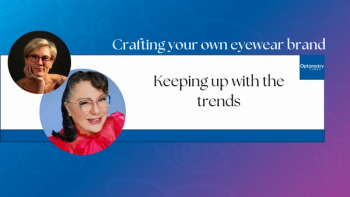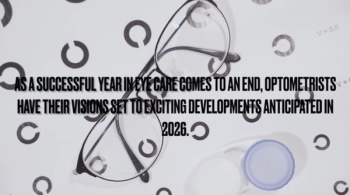
AOA 2024: Discussing advocacy in optometry with 2024 AOSA president
Derek Bryant, incoming AOSA president, is excited about the future of optometry and is dedicated to empowering students to lead and advocate for the profession.
Derek Bryant, the current AOSA president and a student at the Oklahoma College of Optometry, shares his enthusiasm about the 2024 AOA meeting. He values the sense of community within the optometric field, emphasizing the importance of connecting with peers and relaxing during the celebration of optometry.
Bryant's focus this year is on advocacy, aiming to expand its scope beyond legislative interactions to include promoting optometry to patients, friends, and family. He believes in empowering students to become leaders by providing them the space and structure to develop their skills authentically. Bryant emphasizes that leadership should be genuine to each individual to be effective.
He envisions a future where students are more comfortable and proactive in advocating for optometry, particularly at legislative levels. Bryant encourages students to reach out to AOSA trustees for guidance and support in advocacy efforts. He shares his positive experience testifying in a Senate committee, expressing his willingness to help other students navigate advocacy.
Video transcript
Editor's note: This transcript has been lightly edited for clarity.
Derek Bryant:
Hi, my name is Derek Bryant. I attend school at the Oklahoma College of Optometry and I'm the current AOSA president. AOA has been great. It's been an amazing meeting so far. We're so happy to have so many students. Record-breaking numbers for non-AOA+ here. And we're just so excited to share the message that AOA has with optometry students and doctors alike.
I'm really excited about Celebration of Optometry because it's just a great time to have community with the optometric community. We're small, everybody knows everybody. And that's a great thing. And sometimes, you know, in these meetings you get bogged down, and just having that time to relax and get to see everybody and talk is really, really good.
Some exciting things; we are focusing on advocacy this year. We're bringing the message that advocacy is more than just talking to your legislators at Washington DC or in your state's capitol. It's about talking to your patients and your friends and your family and promoting yourself as an optometrist and as an optometric physician. There's a lot of great things we do to provide primary eye care for our patients, and everybody needs to know that message. It's powerful.
We're still in the works with that for sure. We're trying to find the best way to promote that message. It's something that we're kind of reinventing this year. Our wheel wasn't broken, but it could use a little bit of improvement as far as students are concerned and getting that out is going to be a process, and we're really excited to see what it's like. But we are so grateful for the over 7000 students that we do serve, and excited to help improve the profession in quality and quantity, hopefully that'll follow with it.
My style of leadership is allowing people the space to do what they do best, but giving them the structure so that they feel safe to promote themselves as a leader and develop strong leadership skills [with] other students. I have my own style of leadership as well as everyone on my executive council also has their own style of leadership. And I think it's important that you shine in the way that's meant to be for you. If you're trying to lead in a way that's not authentic to yourself, then it's not going to be as high quality. And so that's important to us.
Empowering students means we're becoming the next generation of leaders. Myself and my executive council, we can do a lot of work, but the 5 of us can't do it all. And we want to empower students to lead for themselves and for the future of optometry. And so that's the biggest way we empower. Leadership's a big focus for us because we may not be the biggest profession, but we've got a ton of strong leaders and we want to keep that moving.
In the next 5 years, I'd like to see a shift in the mindset of students that talking to legislators and advocating at a legislative level isn't something that needs to be scary. Students know a lot. We're in the process of taking boards, and we're learning about all these great things, and we have the power to educate legislators. We're experts in our fields, and we're going to be doctors in just a few short years. So there's really no reason to be nervous about it. And we hope that in the future, we can have more students testifying and sharing their stories and sharing the message of optometry.
[If you'd like to become more of an advocate,] talk to your AOSA trustee and trustee elect. They get so many points of contact at these meetings. And we make sure that they're well versed in that. If they don't know how to do it, they know someone to contact that does. Personally myself, I've gotten the chance to testify in a Senate committee. And it was an amazing experience. It was scary at first, but thinking back on it, I'd never have it any other way. And I'd be happy to help anybody. I've talked about how the optometric community is small; I'd give anybody my cellphone number to talk about advocating as a student, and I have no issue with that and I know there's so many [others] like that. Reach out, talk to people, become part of the community.
So I appreciate your time today, and I'm so excited for the future of optometry and the future of our students.
Newsletter
Want more insights like this? Subscribe to Optometry Times and get clinical pearls and practice tips delivered straight to your inbox.













































.png)


